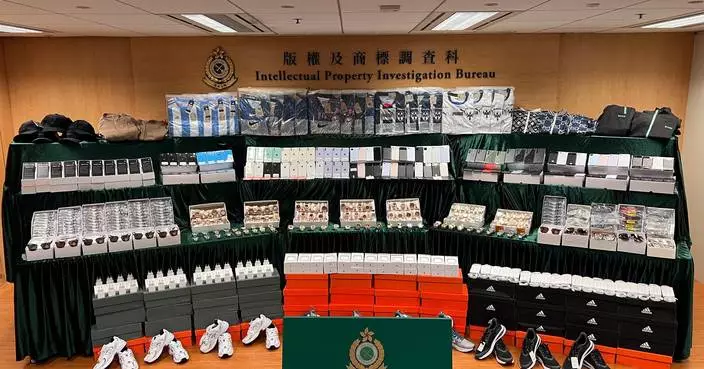Court of First Instance hands down sentence in case concerning terrorism-related offences
The Court of First Instance of the High Court today (November 14) handed down the sentence in a case concerning terrorism-related offences (commonly known as the "Dragon Slaying Brigade" case) involving such offences as "conspiracy to commit bombing of prescribed object" and "conspiracy to provide or collect property to commit terrorist acts" under the United Nations (Anti-Terrorism Measures) Ordinance, "conspiracy to commit murder" under the Offences against the Person Ordinance, "conspiracy to cause explosions of a nature likely to endanger life or to cause serious injury to property" under the Crimes Ordinance, "possession of arms and ammunition with intent to endanger life" under the Firearms and Ammunition Ordinance, etc. The ringleader of the case was sentenced to imprisonment for 23 years and 10 months, and other key persons of the case were sentenced to imprisonment for 10 years or above.
The fact that the defendants were convicted and sentenced to imprisonment demonstrates that any person intending to plan and commit terrorist activities, endanger public security or disrupt societytranquillity can never escape sanctions of the law. Hong Kong is a society underpinned by the rule of law, where laws must be obeyed and lawbreakers be held accountable. People who break the law must face legal sanctions for their malicious acts. The Department of Justice will study the reasons for sentencing in detail and consider whether a review application to the Court of Appeal regarding sentence[s] will be filed.
When handing down the sentence, the Judge clearly pointed out that the defendants of the case aimed at killing police officers, creating social panic, and subverting the Government. The case, which was very vicious, involved premeditated luring police officers out in order to kill them, and it would also cause damage to property.
A Hong Kong Special Administrative Region (HKSAR) Government spokesperson said, "The facts admitted by the defendants indicate that the case involved plans of extreme terrorist violence and gruesome attacks. The circumstances of the case were very serious, in which real guns and explosives were involved. Had it not been for the crackdown on the gang by the Police in time, there would have been heavy casualties. Anyone who commits such nefarious terrorist acts can never escape sanctions of the law, and such malicious acts will surely be duly punished.
"Both the Hong Kong National Security Law (HKNSL) and the Safeguarding National Security Ordinance (SNSO) stipulate offences related to terrorist activities and sabotage endangering national security, and other offences endangering national security, some of which carry a maximum sentence of life imprisonment. In case there are similar cases in future, the HKSAR Government will apply the enhanced laws relating to the safeguarding of national security, including the HKNSL and SNSO, in law enforcement and prosecution in sanctioning criminals. Anyone who advocates terrorism, including glorifying or financing terrorist acts, also commits an offence. The HKSAR Government hereby gives a solemn warning to those terrorists and criminals who recklessly attempt to endanger national security or Hong Kong's public security that they should not defy the law in the hope that they may not be caught."
CHP investigates measles infection case and reminds public that vaccination is the most effective preventive measure
The Centre for Health Protection (CHP) of the Department of Health (DH) is today (November 14) investigating a case of measles infection and reminded the public that vaccination is the most effective way to prevent measles, and people born outside Hong Kong who might not have received a measles vaccination during childhood should review their vaccination history.
The case involves a 22-year-old female with good past health. She had developed fever, runny nose and conjunctivitis since November 8, and developed rash on November 10. She sought medical attention from the clinic at the City University of Hong Kong where she attended on November 12, and was referred to the Accident and Emergency Department of Caritas Medical Centrel and admitted for treatment and isolation on the same day. Her respiratory specimen sample tested positive for the measles virus upon nucleic acid testing. She is still hospitalised and is in stable condition after treatment.
Upon notification of the case, the CHP immediately commenced epidemiological investigations. According to information provided by the patient, she is a student of City University of Hong Kong who was born outside Hong Kong. She is not sure if she had received measles vaccinations in her home country. During the incubation period, she stayed in Hong Kong most of the time. She lived in a student residence of the university located in Ma On Shan and attended classes at the campus in Kowloon Tong during the communicable period. The CHP has maintained a close liaison with the university, the student residence and the medical institutions for follow-up epidemiological investigation. The CHP is carrying out contact tracing at locations the patient visited during her communicable period. All of them have remained asymptomatic so far. The CHP provided health and medical surveillance advice to the contacts, and post-exposure vaccination to non-immune contacts. The CHP has held an online health seminar this evening to remind relevant staff members and students of the university and student residence of precautions for measles and preventive measures. Meanwhile, the CHP has set up an enquiry hotline (2125 2670) for the relevant staff members and students of the university. The hotline will operate from tomorrow (November 15) to November 22 (from 9am to 5pm, Monday to Friday, and from 9am to 1pm on Saturday and Sunday).
The investigations are ongoing.
"The global immunisation coverage rates have dropped since the COVID-19 pandemic. Many countries worldwide are facing a resurgence of measles outbreaks. According to the World Health Organization (WHO), the number of measles cases had risen worldwide to over 300 000 cases reported in 2023, a roughly 80 per cent increase from 2022. The Western Pacific region recorded a total of about 5 000 cases in 2023, which represented more than a 2.5 times when compared with 2022, with persistent transmission found in the Philippines and Malaysia. In view of the continuous increase in measles cases, the WHO has urged parents to bring their children to get vaccinated as early as possible to prevent measles from spreading," a spokesman for the DH said.
The CHP reiterated that vaccination is the most effective way to prevent measles. As revealed by the vaccination uptake of primary school students and the findings of the territory-wide immunisation surveys regularly conducted by the DH, the two-dose measles vaccination coverage has been consistently maintained at a high level, well above 95 per cent, and the local seroprevalence rates of measles virus antibodies reflect that most of the people in Hong Kong are immune to measles. On the whole, the information available indicates that the risk of large-scale outbreak is considered to be low in Hong Kong. However, it is possible for some not fully vaccinated people to get infected and transmit the measles virus to susceptible people (including children aged below 1 who are not due for the first dose of measles vaccine).
The spokesman reminded members of the public that delays in vaccination will weaken the protection for children against measles, and parents are reminded to maintain up-to-date vaccination for their children for comprehensive and timely protection. All people who are non-immune to measles, especially foreign domestic helpers, people working or studying in tertiary institutions, and workers of sea/land/air border control points who may be at a higher risk of contacting an imported case, should receive two doses of measles-containing vaccine. In general, people can be considered as non-immune to measles if they (i) did not have the infection confirmed by laboratory test before, and (ii) had not received two doses of measles-containing vaccines in the past, or have unknown vaccination status or unknown immunity against measles. On the other hand, as measles was endemic in Hong Kong and most parts of the world before 1967, people born before 1967 are considered to have acquired immunity to measles through natural infection.
The spokesman supplemented that, members of the public who are planning to travel to places with a high incidence or outbreaks of measles should review their vaccination history and past medical history, especially people born outside Hong Kong who might not have received a measles vaccination during childhood. Those who have not received two doses of measles-containing vaccines, with unknown vaccination history or unknown immunity against measles, are urged to consult their doctor for advice on vaccinations at least two weeks before departure.
The spokesman advised, "The incubation period (the period from infection to appearance of illness) of measles ranges from seven days to 21 days. Symptoms of measles include fever, skin rash, cough, runny nose and red eyes. If symptoms arise, members of the public should wear surgical masks, stop going to work or school and avoid going to crowded places. They should also avoid contact with non-immune persons, especially persons with weakened immunity, pregnant women and children aged below 1. Those suspected to have been infected are advised to seek medical attention as early as possible and reveal relevant contact history of measles to healthcare professionals."
Besides being vaccinated against measles, members of the public should take the following measures to prevent infection:
• Maintain good personal and environmental hygiene;
• Maintain good indoor ventilation;
• Keep hands clean and wash hands properly;
• Wash hands when they are dirtied by respiratory secretions, such as after sneezing;
• Cover the nose and mouth while sneezing or coughing and dispose of nasal and mouth discharge properly;
• Clean used toys and furniture properly; and
• Persons with measles should be kept out of school till four days from the appearance of a rash to prevent the spread of the infection to non-immune persons in school.
For more information on measles, the public may visit the CHP'smeasles thematic page. Members of the public who are going to travel can visit the website of the DH'sTravel Health Servicefor news of measles outbreaks outside Hong Kong.






